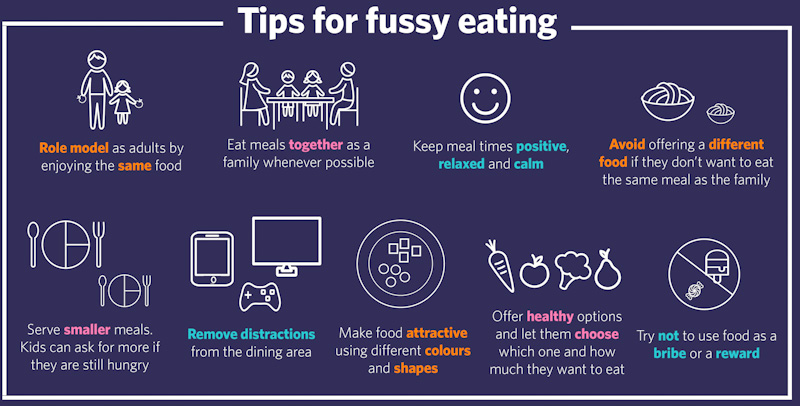
Fussy Eating
Fussy eating is normal. It is a way for children to explore their environment and assert their independence.
Most toddlers will refuse to try new or unfamiliar foods at some stage. You might even find that they will like something one day but dislike it the next. A regular routine for meals and snacks can help toddlers to develop healthy eating habits. For example, three meals a day with small snacks in between.
It’s also common for toddlers to eat different amounts from day to day and meal to meal. Their appetite will change as they grow and develop. Children will learn to know when they are hungry and full if they are allowed to control how much they eat. Unless they are sick, a child will eat when hungry.
It can be concerning and frustrating when your child refuses to eat the food you have provided. Below are some tips that might help manage fussy eating:
-
Keep mealtimes relaxed and positive. Congratulate your child when they try something new. Keep calm and don’t make a fuss if your child refuses food.
-
It can take 15-20 tries before your child accepts a new food, so don’t give up! Be patient and keep trying.
-
When introducing a new food, serve it alongside foods they already eat and are familiar with. Only serve a small amount of the new food.
-
Setting a time limit for meals can be useful. You might like to allow 10-20 minutes for snacks and 20-30 minutes for mealtimes. If your child hasn’t eaten the food in this time, allow them to leave the table and safely store the uneaten food.
-
For a toddler, enjoying food can mean touching, feeling and playing with it. Let your child feed themselves and use their hands, even if it is a bit messy.
-
Involve your child in food preparation tasks, such as stirring, pouring, spreading and cutting (where age appropriate). Your child will be more likely to try the food if they have help prepare it.
-
Try not to use food as a bribe or reward. Use non-food-based rewards instead.
-
Be a role model by eating and enjoying a range of healthy foods. Your child will learn to be a good eater by watching those around them.

Other Causes Of Fussy Eating
Fussy behaviour can also be due to other reasons. For example, teething or lack of sleep.
If you are concerned about your toddler’s fussy behaviour, speak to your GP, child and family health nurse or a dietitian.
For More Information
-
Fuss Free Mealtimes (available in Arabic, Chinese, English and Korean)
-
Munch & Move – Encouraging children to try new foods and managing fussy eaters



